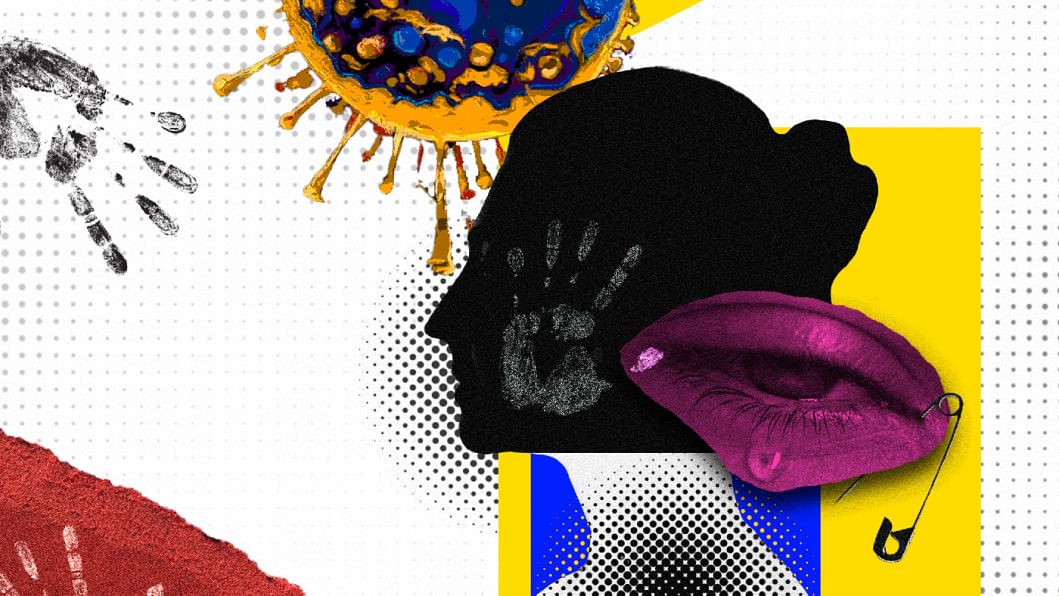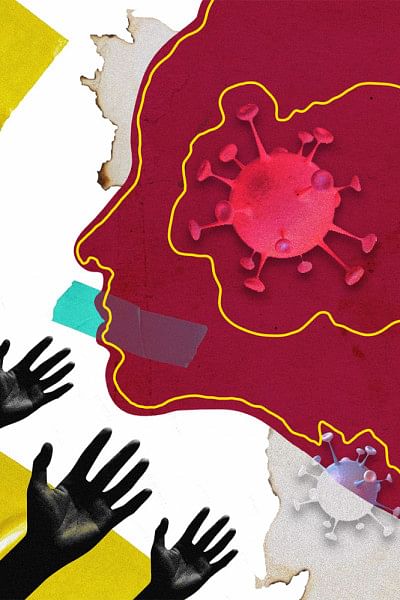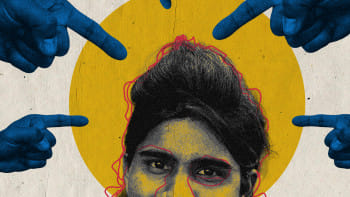Caught between two pandemics

It's business as usual for Saleha Begum, 38. After the lockdowns are lifted, her daily struggles have only become harder due to ever-increasing inflation. Other aspects of life remain more or less the same. But when asked about how she and her family fared during the Covid pandemic, she falls silent. She collects her thoughts before speaking up in shorter sentences, marked by frequent pauses.
"My husband's business was down during the pandemic. He couldn't buy and sell cows. When I told him to bring groceries, he got angry. When he couldn't control his anger, he beat me up," relates Saleha. Citing financial hardship compounded by lockdown rules which forced men to stay indoors, stories like these surfaced in newspapers by June 2020, when Bangladesh, like most other South Asian and South East Asian countries, was tackling the shock of the first phase of the lockdown. But what Saleha divulges as she continues to speak with her staccato sentences constitutes a story that perhaps remains outside the scope of a media or NGO report.
"Lockdown rules were not as strict in villages as they were in cities or towns. So my husband left the house for work at times. They said it wasn't wise to be physically intimate with someone who went out of the house during the pandemic. Despite my reservations, my husband forced me into sex. When I refused, he stopped talking to me and buying groceries," she pauses and takes a deep breath. "It was difficult to access family planning services during corona. But my husband wouldn't listen. Nor would he use contraception. So I got pregnant. I wanted to keep the child. But my husband forced me to abort it," she adds.
The abortion was carried out without the help of any trained professional. She was made to take some herbal medicine which caused severe pain both during and after the abortion. At this stage, Saleha mentioned the Landless Peasants' Organisation, an autonomous body which comprises both men and women, and works to protect girls and women from early marriage and violence, among other issues, with support from Nijera Kori. She said she couldn't reach out to any landless member for assistance due to the lockdown.
"Men get worse if they stay at home doing nothing," observes a postmenopausal woman, requesting anonymity. This insight partly explains why many women experienced increased violence or tension during the pandemic.
The violence a woman faced at the hands of her addict husband is perhaps the most horrendous. A neighbour named Aklima, 38, shares the survivor's story but chooses not to mention her name fearing backlash from the addict husband. Referring to a red pill, locally known as yaba, she says, "Her addict husband would smoke the pill and come home in the evening to torture her all night. One night, the assault was so terrible that she was badly injured, her private parts swollen and breasts showing marks of biting. Hearing her scream, other neighbours and I rushed to their home and took her to a hospital. When she was discharged, we took her to a neighbour's home. The next day, her paternal family was informed. Her brothers came and took her back to their home, along with her two sons. Meanwhile, the husband was not punished by the chairman."
This story gives a bleak picture of sexual violence during the pandemic but it also gives us the story of the woman who, along with her neighbours, saved the survivor's life. It shows the utmost importance of interventions made at times by neighbours and at other times by landless members. Effective interventions can also come from within the family.
Consider the case of Mukta Bibi, 56, for example. "One day, my husband attempted to physically attack me after an argument, but I was able to escape. My younger son intervened and told my husband that his actions were disgraceful. Then he backed down," she says.
Afia Khatun, 36, has an entirely different story to tell. "My husband works in Dhaka and came home during the lockdown. We both worked on other people's land in addition to our own, but we managed to get by despite our poverty. We rarely argued. Though I got angry sometimes, my husband never did. After the lockdown, my husband returned to Dhaka. Being a social worker, I volunteered to distribute the municipality-provided food among the poor. I find joy in helping others. My husband supports me fully, and that's why I have come this far. Many people call up my husband and tell him that I stay outside all day. But my husband never pays attention to them. He tells me not to listen to these people," she says. Afia is an active LPO member. Anecdotes like Afia's are proof that there also are stories where there is mutual respect between a couple.
Numerous stories like these emerged during our research, commissioned by Nijera Kori (NK), which sheds a new light not only on violence against women (VAW) during the pandemic but also on many hitherto uncharted terrains, including expressions of sexuality as practised by both men and women, and perceptions of sexuality held my men and adolescents. A total of 675 respondents from 25 upazilas under 12 districts were interviewed for the purpose of the study. Data was collected over a period of 6 months. Respondents aged 18-50 years were preferred while selecting married or once-married respondents. Adolescents were aged 11-18.
To ensure inclusivity, the research includes Bengali, Adivasi, and Dalit respondents. Among the 675 respondents, there were 423 women (married or separated or divorced or widowed), 122 men and 140 adolescents. Of the adolescents, 87 were girls and 53 boys.
According to the study, 17 percent of women experienced physical abuse during the Covid-19 pandemic, 30 percent of them reported mental torture while 34 percent reported no harassment or abuse (19 percent of women did not respond). Women experienced marital rape not only when they were forced into sex but also when they felt compelled to fulfil their husbands' desires, fearing verbal abuse or physical violence. Twenty-two percent of female respondents reported an increase in marital rape during the pandemic, while 52 percent of them said the situation was unchanged (26 percent did not respond).
With female respondents talking more comfortably about the times preceding and following the pandemic, the study reveals data about the general picture of VAW:
18 percent of men continue to beat their wives while 30 percent of them have ceased the practice after being associated with the LPO. Over 16 percent of men still slap their wives while over 35 percent of them claim they never engaged in any form of abuse.
16 percent of women report being subjected to various forms of harassment while 38 percent of them say they are not beaten up any more; 11 percent of them report that their husbands still slap them while 26 percent report never having experienced violence. Six percent of the female respondents are still being beaten and kicked while only 1 percent report having experienced all forms of harassment.

Slapping is Not Violence
In spite of visible progress due to interventions made by the landless organisation, violence in the form of slapping, grabbing and hair-pulling continues as a large number of both male and female respondents believe that a husband has the right to occasionally slap or grab his wife in order to discipline and correct her. Ahmed Sagir, 37, says, "It would be wrong to call slapping a form of violence. Men are meant to correct women".
Halima Akter notes, "A man has the right to slap his wife if she does anything wrong. However, the man should talk to her first. If she doesn't understand, then he could slap her. Our mothers and aunts used to say that the body part beaten by the husband goes straight to heaven. But this is not true, our prophet never even scolded his wives. Our neighbour Iman Ali beat his wife up. I told him you could have slapped her instead of beating her. I convinced him to become a member of the landless organisation and seek training. Now he is doing better. They discuss things with each other."
Another female respondent, Shahina Akter, 33, says, "My husband does not beat or torture me. He sometimes slaps me, but later he loves me."
Both Jahanara and Shahina's responses are telling. They demonstrate how the positive impact of interventions has contributed to curbing violence but they also show how violence in the form of slapping is still seen as a justified and corrective measure. However, we also found many instances where male respondents shunned all forms of violence, including slapping and grabbing.
Birth Control and Constructions of Masculinity
Even a cursory look at the data on birth control shows how social constructs affect people's perception about birth control methods and responsibilities. According to the study, 64 percent of women consider birth control to be their responsibility, 17 percent of them believe it is the man's responsibility, and only 12 percent think it is a shared responsibility. The remaining 7 percent of women are not sure whose responsibility it is.
Eighty-five percent of women report that their husbands never use condoms while 14 percent say their husbands use condoms occasionally. Among the women respondents using birth control methods, 28 percent use injections, 16 percent government-provided Sukhi pill, 15 percent Femicon tablets, 8 percent a combination of Sukhi pill and Femicon; 7 percent of women have stopped menstruating, 5 percent use natural birth control methods, and 4 percent have undergone ligation.
As for men, 96 percent of them say birth control is a woman's responsibility; 3 percent of them say it is a man's responsibility and 1 percent say birth control is the responsibility of both women and men.
When male respondents are asked whether they use any birth control methods, the study notes, many of them are very surprised. Arifur Rahman, 37, says, "This is what women do, it's their business. It's not a man's business." Another states he uses condoms only during his wife's menstruation.
This belief perhaps explains why the prevalence of condom use among male respondents is very low. They use it sometimes when their wives forget to take the pill or when there is no pill at home.
As many as 86 percent of men have never used a condom; 12 percent of them use it sometimes and only 1 percent always use it, and another 1 percent have a vasectomy.
Some of the respondents view condoms as a threat to their masculinity, and even mock those who used condoms. One respondent from Dhanbari says, "Men who use condoms are idiots."
There are similar reservations about the practice of vasectomy among the respondents. One man in Saghata, who underwent a vasectomy, says he feels weak as a result of the operation and now regularly mentally abuses his wife over the matter. Only four men in this study report having had a vasectomy, indicating that despite the interventions by various NGOs to popularise this birth control method, it is still widely seen as "unmanly" or as having negative consequences.
There is an array of myths regarding condom use in the communities studied, most of which have been circulated by men. Some women report that they had heard that condoms cause vaginal infections because they get stuck inside the belly. Some say that they do not ask their husbands to use condoms as they toil hard in the field and it is their responsibility as women to take care of birth control.
As a result of prolonged use of pills and injections, some women, particularly in northern Bangladesh, report experiencing early menopause, and as a result, losing their interest in sex. This causes even more misery for them, as unwillingness to have sex often leads to physical violence and verbal abuse.

Alarmingly, both the women and their partners view early menopause as a positive outcome as "the hassle is gone", rather than recognising it as a problem. In some cases, the husbands are completely unaware of their wives' menstrual and reproductive health.
Respondents also report negative side effects of oral contraceptive pills, similar to injections. Women who take oral contraceptive pills often experience headaches, dizziness, weakness and nausea. Many respondents say they stopped taking Sukhi (pill supplied for free by the government) because it had more visible side effects and made them feel ill. Most of them prefer Femicon or other commercial pills, although many women cannot tolerate those either. In some women, contraceptive pills cause irregular periods, excessive bleeding, and other typical side effects.
For some respondents, the arm implant known as Norplant, which involves insertion of three sticks into the arm muscle, caused continuous vaginal bleeding after insertion. Some others, the flesh around the area of insertion started to rot, forcing them to get rid of the implant. Both the insertion and the removal are painful, report women. The vaginal implant known as Copper-T also causes side effects like irregular periods, nausea, weakness, and vertigo among women who used it.
Dowry and Early Marriage
According to the study, most of the female respondents (78 percent) were married at a very young age and had limited knowledge of sexuality prior to their marriage. Some of them had just started menstruating after getting married, which made them fearful of physical intimacy with their husbands. However, the support and encouragement from their grandmothers and aunts helped them to overcome their fears.
Some men (17 percent) were married off at an early age as well. Many respondents have a huge age gap with their spouses.
The study has also found that 12 percent of female respondents were married between the ages of 7-9 and 72 percent between the ages of 12-16. Despite awareness of the negative effects of early marriage and dowry, many guardians still practise these customs.
The study finds it worth noting that most of the respondents consider receiving dowry as a crime. Their organisation has been actively campaigning against dowry for long. The male respondents report not having asked for dowry at their weddings. Some say receiving dowry was not a widespread practice at the time of their marriage while some others claim that despite not asking for dowry, they still received gifts from their in-laws.
In this study, 40 percent of the female respondents report that their families had to pay dowry at their weddings, 30 percent say that no dowry payment was made and 29 percent say the groom's family did not demand dowry, but the bride's family gave jewelry and money voluntarily. Only 1 percent of women have received bride payment.
The research team also observes that early marriages and dowry practices continued during the COVID-19 pandemic. The following are some of the accounts shared by the female respondents regarding dowry and early marriage:
"Dowry wasn't demanded at my wedding, but my parents still gave BDT 8000. My elder daughter was married off during Covid-19. Though it was an early marriage, I did not want to pass up the opportunity because we had found an excellent suitor," says Mosammat Toha Banu, 35.
Fahima Akter, 56, says, "No dowry was paid during my wedding. My two sons and two daughters are married. We didn't demand any dowry during our sons' marriages. The brides' family gave some gold voluntarily just as we gave our sons-in-law gold rings. My younger daughter's in-laws put a lot of pressure for dowry after her marriage. When we refused to pay, her husband remarried. My younger daughter now lives with us along with her daughter. I have filed a case against my son-in-law for not providing for his wife and daughter."
Hindu respondents share a different perspective on dowry as the inheritance laws in Bangladesh do not permit Hindu women to inherit property. So, dowry is considered a 'normal' practice within the Hindu community.
"Among us Hindus, a girl gets only what she gets during the wedding, after which she has no right to her father's assets. During my marriage, my in-laws made no demand, but my brother gave me 5 grams of gold and cash to buy furniture. I wore the gold as jewelry, and the cash was given to my in-laws," says Bithika Chakrabarty, 25.

Sexual Expressions and the Social Construct of Good vs Bad Woman
Talking about issues of VAW and status of sexual and reproductive rights of women, a great majority of respondents referred to discourses surrounding notions of a "good vs bad" woman. These discourses, shaped by many factors, including those relating to social and religious conservatism, dictate what a good woman should do in any given circumstance. They also explain why men inflict violence on women in many instances as a corrective measure whenever she strays from the path prescribed as "good" for her.
The societal expectation is that women would do the domestic chores, make their husbands happy, never disagree with them, and above all, agree to have sex whenever their husbands desire. If a woman carries out these duties, she is considered a "good" woman. If she defies these norms, she is termed as a "bad" woman.
The dichotomy of "good vs bad" applies strongly to women's expression of sexual desires. One respondent from Dhanbari talked about the social repercussions of having expressed her sexual desire to have sex every day to her husband. Her husband not only rebuked her, but also shared the information with their neighbours, which led to her being branded as a "debauched" woman. The neighbours, even the woman's daughter, despise her due to this.
However, the scene is in no way static. Excerpts from the interviews below show that younger generations of women show a greater awareness of their rights and greater success in realising their rights.
Ninety-two percent of male respondents believe that men have a greater interest in sex, while only 4 percent believe men and women have equal interest. On the other hand, 74 percent of female respondents feel that men exhibit greater sexual interest, with only 3 percent expressing their own interest. Meanwhile, 16 percent of them believe that women have an interest in sex but are unable to express it due to restrictive social norms.
"I don't face any issues related to sex. If I say no, my husband respects and does not force me. I never express my desire. I feel shy. I believe it's sufficient for men to say it, why would women need to express it?" says Mosammat Monowara Khatun, 28.
Ajmeri Akter, 36, says, "We engage in sexual activity. There are no issues in that regard. My husband doesn't push for it excessively. Why would I approach him to have sex? Can women tell men about it? It's so shameful!"
Mosammat Habiba Jannat,18, says: "I knew about sex and birth control before marriage. This is the age of the internet and information is easily accessible through mobile phones. I tell him if I want to have sex, and refuse otherwise."
Teenagers' points of view
It is noteworthy that teenagers have provided the research team with critical information on early marriage and dowry during the Covid-19 period. They are aware and informed about the issues and they speak from their personal experiences.
It is commendable that the LPO has a wing for adolescents, where they can obtain hands-on computer skills and learn about the harmful effects of early marriage and dowry, changes during puberty, and their rights. Early marriage prevention committees are comprised of these adolescents who campaign for prevention of early marriages in their villages.
"I've never experienced eve-teasing personally, but when I saw a boy pulling my friend's scarf, I protested against it and told our teachers. The situation was resolved after that. I was part of a successful effort to prevent an early marriage in our village during the pandemic," says Tasnia Tabassum.
Ritu Mondal, 18, says: "Guardians married their daughters off secretly during Covid-19 by taking the bride to a relative's home for the ceremony. The daughters would often return home after a year of marriage. We couldn't protest then. Nevertheless, we offer support to victims of early marriage who come back from their in-laws' house after having been tortured. We talk about their problems, offer comfort and encourage them to start a new life."
Farhana Afrin, 17, speaks from her personal experience. She reveals how elected members of local government act in collusion with parents. "I witnessed several early marriages in my community during the pandemic. The Union Parishad is partially responsible for this as they had provided forged certificates, which is why I couldn't prevent a couple of early marriages."
Despite the prevalence of early marriage and dowry practices in the larger society, adolescents keep the fight on by raising awareness about the dangers of early marriage and dowry, and protesting against these practices in their villages through the landless peasants' organisation.
This research shows us how interventions play a highly critical role in preventing VAW and early marriage, as well as making women and girls aware about their rights. Conversely, it also shows there is a lot more to achieve in the areas of VAW, birth control, and early marriage. By presenting us with data collected from several hundred respondents, this study gives us numerous stories, many of which make us sad but many of which give us hope about positive social changes. As the interviews have been documented in detail, it was easy to notice that many respondents have gone through transformations. Those who some 20 or 40 years ago held a conservative view about, say, VAW, or dowry, or sexual rights, have grown to become quite liberal in their later years. The biggest ray of hope, though, comes from the young and teenaged clusters of respondents. They show so much promise and commitment that it is only fair to say that the campaigns and interventions introduced by landless organisation must be continued and if possible, strengthened to address VAW and other related issues more effectively in the future.
Zobaida Nasreen is professor at University of Dhaka and lead researcher of the study.

 For all latest news, follow The Daily Star's Google News channel.
For all latest news, follow The Daily Star's Google News channel. 













Comments